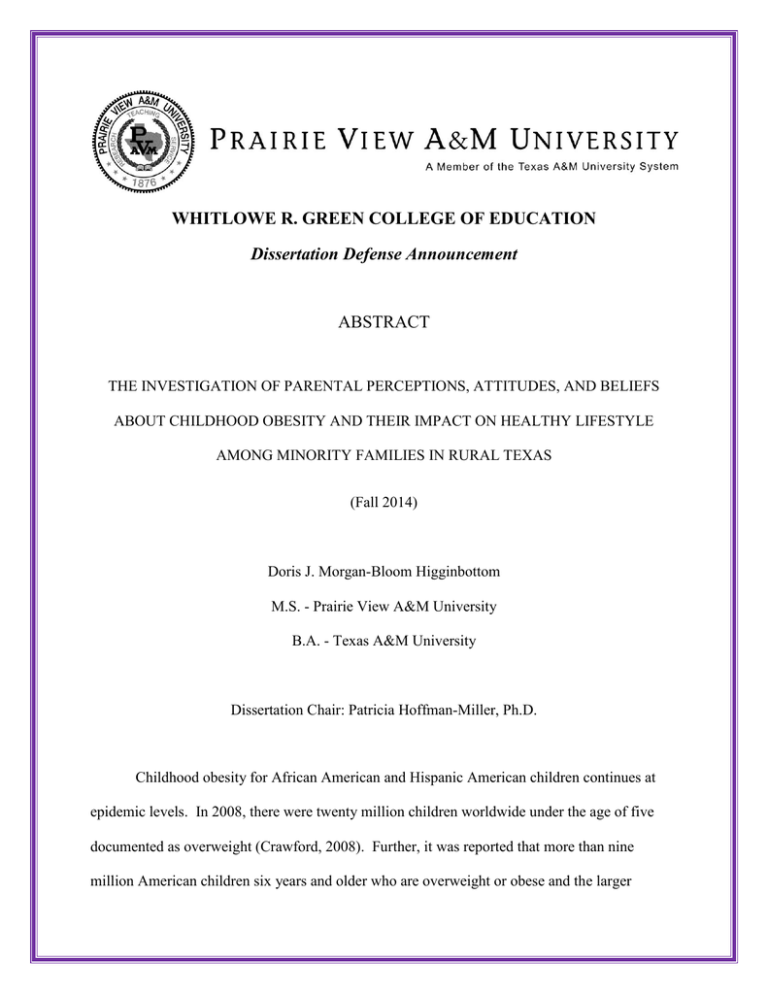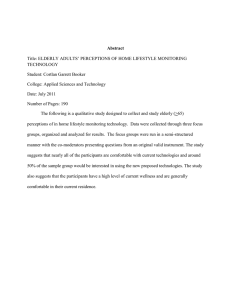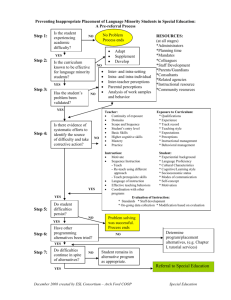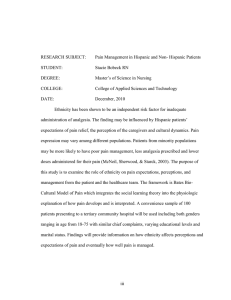WHITLOWE R. GREEN COLLEGE OF EDUCATION Dissertation Defense Announcement ABSTRACT
advertisement

WHITLOWE R. GREEN COLLEGE OF EDUCATION Dissertation Defense Announcement ABSTRACT THE INVESTIGATION OF PARENTAL PERCEPTIONS, ATTITUDES, AND BELIEFS ABOUT CHILDHOOD OBESITY AND THEIR IMPACT ON HEALTHY LIFESTYLE AMONG MINORITY FAMILIES IN RURAL TEXAS (Fall 2014) Doris J. Morgan-Bloom Higginbottom M.S. - Prairie View A&M University B.A. - Texas A&M University Dissertation Chair: Patricia Hoffman-Miller, Ph.D. Childhood obesity for African American and Hispanic American children continues at epidemic levels. In 2008, there were twenty million children worldwide under the age of five documented as overweight (Crawford, 2008). Further, it was reported that more than nine million American children six years and older who are overweight or obese and the larger percentage are within the minority community (Axmaker, 2010). Research conducted by Ogden and Carroll (2010) found a significant increase in the prevalence of obesity for African American boys, Hispanic American boys, African American girls, and Hispanic American girls. Alarmingly, researchers reported in 2007; nearly half of the children population in the country was obese or overweight (Harrington, Nguyen, Paulson, Garland, Pasquinelli, and Lewis, 2010). Additionally, Arons (2011) researched and found obesity-related medical costs in Texas exceeded $1.37 billion. He also reported, when children become obese adults, their medical costs are 42% greater than normal-weight individuals (Arons, 2011). Theoretical Framework This study focused on African American and Hispanic American children identified as overweight or obese who are living in south central, Texas. The researcher utilized work from Albert Bandura (Social Learning Theory) and Lev Vygotsky (Socio-cultural Theory) as a theoretical framework for this study. These authors espoused the impact of the social environment and culture on behavior. Social Learning Theory emphasizes the importance of learning within the primary context of observation, attention, retention, motivation, and reproduction (Hakvoort, 2002). In addition, Socio-cultural Theory recognized the importance of culture on learning. The central tenet of socio-cultural theory is the importance of social interaction in the development of thinking. This framework will assist parents, educators, health officials, and government officials who strive to resolve this problem which will eventually provide interventions for the two ethnic group’s burden by obesity (Arons, 2011). The purpose of this quantitative study was to investigate the impact of the USDA Choose MyPlate healthy educational information on the perceptions, attitudes and beliefs of African American and Hispanic American parents regarding children’s healthy lifestyle. Also, to examine the effects of change in the perceptions, attitudes, and beliefs of African American and Hispanic American parents concerning children’s healthy lifestyle on the obesity level of their children. Furthermore, to determine if parents perceptions change as a result of implementing USDA Choose MyPlate information versus Just in Time Parenting. This research was guided by the following research questions: 1. What is the difference in minority parents' perceptions, attitudes, and beliefs about children’s healthy lifestyle, as measured by their Health-Promoting Lifestyle Profile-II (HPLP-II) pretest scores based on the type of nutrition education information group? 2. What is the difference in minority parents' perceptions, attitudes, and beliefs about children’s healthy lifestyle, as measured by their HPLP-II posttest scores, based on the type of nutrition education information received? 3. What is the difference in the change of minority parents' perceptions, attitudes, and beliefs about children’s healthy lifestyle, as measured by the difference between their pretest and posttest HPLP-II scores, based on the type of nutrition education information received? 4. What is the relationship between minority parent’s perceptions, attitudes, and beliefs about children’s healthy lifestyle, as measured by their posttest and change HPLP-II scores and the post and change body mass index (BMI) of their children? The investigator utilized the Health-Promoting Lifestyle Profile II as a pre-questionnaire and post-questionnaire instrument. This study was conducted by obtaining these data from Waller County Independent School Districts. The researcher utilized the Statistical Package for Social Sciences 22 (SPSS) to compare the two groups (experimental and control). Date: __October 22, 2014____ Department: Educational Leadership and Counseling Time: _10:00am_____________ Location/Room: Delco 220 Dissertation Chair: Dr. Patricia Hoffman-Miller_ Dissertation Committee Members: Angela Branch-Vital, Ph.D. Carl Gardiner, Ed.D. William Kritsonis, Ph.D. Solomon Osho, Ph.D. Laxley Rodney, Ph.D.





